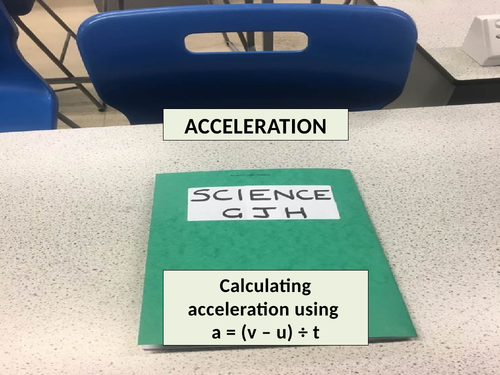


A resourced lesson which looks at calculating acceleration using the (v-u)/t equation. This lesson includes an engaging lesson presentation (26 slides) and a worksheet of questions that can be used for homework or during the lesson. The lesson begins by looking at the actual meaning of acceleration, ensuring that students understand it is a rate and therefore recognise the units as a result. A number of engaging activities are included in the lesson, such as the ACCELERATION OLYMPICS, to maintain motivation. Students are shown how to rearrange the equation to make velocity or time the subject and then challenged to apply these in a series of questions. Deceleration is briefly mentioned at the end of the lesson.
This lesson has been primarily designed for students studying GCSE (14 - 16 year olds in the UK) but it is suitable for students at KS3 too.
Get this resource as part of a bundle and save up to 36%
A bundle is a package of resources grouped together to teach a particular topic, or a series of lessons, in one place.
Topic P1: Motion (Cambridge iGCSE Science Double Award)
This bundle of 9 lessons covers the majority of the content in Topic P1 (Motion) of the core and supplement sections of the Cambridge iGCSE Science Double Award specification. The topics and specification points covered within these lessons include: Define speed and calculate average speed Distinguish between speed and velocity Define and calculate acceleration Plot distance-time graphs and speed-time graphs Calculate acceleration and distance travelled from a speed-time graph Distinguish between mass and weight Recall and use the equation W = mg Describe how forces can affect a body Plot and interpret extension-load graphs Understand Hooke's Law Friction and air resistance Resultant forces Calculating moments The principle of moments All of these lesson presentations and accompanying resources are detailed and engaging and contain regular progress checks to allow the students to constantly assess their understanding
Topic P2: Motion and forces (Edexcel GCSE Combined Science)
This bundle of 10 lessons covers the majority of the content in Topic P2 of the Edexcel GCSE Combined Science specification. The topics covered within these lessons include: Scalar and vector quantities Velocity Calculating speed Distance-time graphs Recall and use the acceleration equation Use the equations of motion equation Velocity-time graphs Recall some everyday speeds Use the equation to calculate weight The relationship between weight and gravitational field strength Recall and use the equation for momentum Momentum in collisions The factors affecting stopping distances All of these lesson presentations and accompanying resources are detailed and engaging and contain regular progress checks to allow the students to constantly assess their understanding.
Topic P5: Forces (AQA Trilogy GCSE Combined Science)
This bundle of 14 lessons covers the majority of the content in Topic P5 (Forces) of the AQA Trilogy GCSE Combined Science specification. The topics covered within these lessons include: Contact and non-contact forces Weight, mass and gravity Resultant forces Work done Investigating springs Speed and velocity Acceleration Distance and velocity-time graphs Terminal velocity Stopping distances Reaction times Momentum All of these lesson presentations and accompanying resources are detailed and engaging and contain regular progress checks to allow the students to constantly assess their understanding.
Topic P2.1: Motion (OCR Gateway A GCSE Combined Science)
This bundle of 6 lessons cover all of the content in the sub-topic P2.1 (Motion) of the OCR Gateway A GCSE Combined Science specification. The topics or specification points covered within these lessons include: Measuring distance and time to calculate speed Conversion from non S.I. units to S.I. units Be able to distinguish between scalar and vector quantities Relate changes in motion to distance-time and velocity-time graphs Calculate distance travelled from a velocity-time graph Calculate average speed for non-uniform motion Apply the equations of motion Calculating acceleration Calculating kinetic energy All of these lesson presentations and accompanying resources are detailed and engaging and contain regular progress checks to allow the students to constantly assess their understanding.
Topic P2: Forces (OCR Gateway A GCSE Combined Science)
This bundle of 14 lessons covers the majority of the content in Topic P2 (Forces) of the OCR Gateway A GCSE Combined Science specification. The topics covered within these lessons include: Speed and velocity Acceleration Distance and velocity-time graphs Contact and non-contact forces Free body diagrams Resultant forces Terminal velocity Momentum Conservation of momentum Mass, weight and gravitational field strength Gravitational potential and kinetic energy Work done and power Hooke's Law All of these lesson presentations and accompanying resources are detailed and engaging and contain regular progress checks to allow the students to constantly assess their understanding. It is estimated that this bundle would cover over 6 week’s worth of lessons.
Something went wrong, please try again later.
This resource hasn't been reviewed yet
To ensure quality for our reviews, only customers who have purchased this resource can review it
Report this resourceto let us know if it violates our terms and conditions.
Our customer service team will review your report and will be in touch.